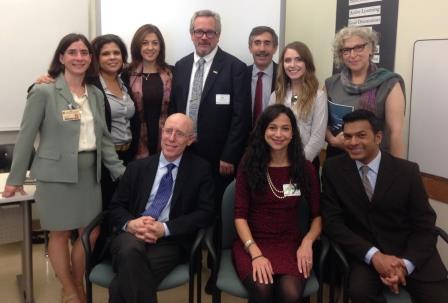
Supportive social networks as well as English language skills are crucial factors in the economic prosperity of college-educated immigrants. These were some of the takeaways from the Boston launch of the report Steps to Success: Integrating Immigrant Professionals in the United States on November 5, 2015, at the Asian American Civic Association in Boston’s Chinatown. The report was published by IMPRINT. The findings of the report were presented by co-author Dr. James Witte, research director at the Institute for Immigration Research, a joint venture between The Immigrant Learning Center, Inc. (ILC) and George Mason University.

The report launch featured a panel discussion moderated by director of The ILC Public Education Institute Denzil Mohammed, a testimonial from Iraqi immigrant Rasha Noori, MD ARDMS, and remarks from both Chief of Economic Development for the City of Boston John Barros and Massachusetts Undersecretary for Workforce Development Ronald G. Marlow. Through spirited discussion, immigrant professionals in attendance sought tangible solutions to the barriers they faced in a host of industries. Other attendees acquired new knowledge to further their work in serving immigrants in the Greater Boston area.
Thousands of immigrant professionals were surveyed in Boston and around the country. The survey found that respondents’ social capital (number of supportive family and friends in the U.S.) and proficiency in English were both highly correlated factors of their economic success, which was measured by annual salary (“earnings success”), use of higher education (“skills success”) and employment in a managerial or professional occupation (“professional success”). Additional findings include:
- Living in the U.S. for six years or more was strongly correlated with higher incomes, lower rates of unemployment, higher rates of volunteering and better English skills.
- In Massachusetts, high-skilled workers who are reported to have limited English proficiency and foreign degrees have the highest unemployment rate among college-educated immigrants (8.8 percent).
- Boston-area respondents were 1.3 times more likely to have applied for U.S. professional licensure compared to respondents from all other areas.
The report also included recommendations for policymakers, service providers and funders.
This report launch was made possible by a collaborative effort among The ILC Public Education Institute, Massachusetts Immigrant and Refugee Advocacy Coalition, Mayor’s Office of New Bostonians, WES Global Talent Bridge, IMPRINT and the Asian American Civic Association.
